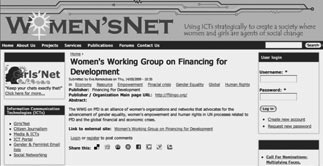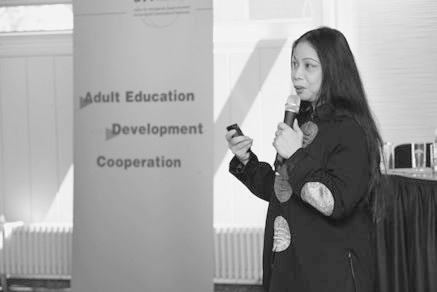Women’s Working Group on Financing for Development 1
United Nations Meeting in New York Time to Act: Women Cannot Wait
A Call for Rights Based Responses to the Global Financial and Economic Crisis
June 2009
We, the Women’s Working Group on Financing for Development (WWG on FfD) are deeply concerned that the draft outcome document of the UN Conference on the World Financial and Economic Crisis and its Impacts on Development continues to support the failed policies and flawed governance system that have created the current crises. We underscore that the financial and economic crisis exacerbates the disastrous impacts of the global food, energy, and climate crises, which have increased the number of hungry and undernourished people worldwide to over one billion, the majority of which are women and children. We recognize the pivotal role of the United Nations in addressing the impacts of these multiple crises and the crucial need to strengthen the UN’s ability to fulfil its development mandate. We urge governments not to make this conference a missed opportunity to build a global consensus around a multilateral economic governance system that is fair, inclusive, gender equitable, rights-based and pro-development.
We urge member states to ensure that the Conference outcome is not business as usual and provides the necessary resources and effective follow-up mechanisms. We are concerned that the G-20 has taken a prominent role that undermines the UN as the legitimate forum for the resolution of this crisis.
It is only through a more inclusive approach that the search for solutions can move beyond double standards, the perpetuation of moral hazard, the inequitable distribution of resources, and disproportionate burdens on the most vulnerable. Women and all the other social groups affected by the crisis are key to a response that is harmonized with international standards and commitments to gender equality, women’s rights and human rights and empowerment. Such response requires the following actions:
I. Re-position the UN’s leadership role in a new global development, economic and financial architecture that fully integrates gender equality and women’s rights
- Strengthen the authority of the UN to lead the necessary rights-based pro-development economic and financial reforms, in particular responding to issues of global macroeconomic policy including its social and ecological dimensions.
- Ensure that the UN reform process does not undermine the capacity of the UN Funds and Programs, and UN agencies to fulfil their respective mandates in advancing development and gender equality, and in protecting the development gains threatened by the current economic crisis.
- Ensure concrete recommendations on new foundational and structural agreements on global development, economic and financial governance that fully integrates gender equality and women’s human rights based on internationally agreed goals, including the Beijing Platform for Action, the Convention on the Elimination of All forms of Discrimination Against Women (CEDAW), and International Labour Organization Conventions.
- Establish mechanisms to ensure cooperation and follow-up on the actions and substantive recommendations of the UN Conference through the working groups on Global Stimulus Resources, Reforms of the International Financial System and Architecture, and on Global and Regional Reserve Systems.
- Develop a global stimulus package for economic growth, creation of full and productive employment and decent work for safeguarding economic gains, social protection, food security and human development. Any such additional resources channelled through the IMF and World Bank-proposed Vulnerability Fund and Framework, should be contingent on necessary reforms in these institutions. For developing countries, the financial resources should be sufficient, without any policy conditionality, and should not result in increased debt.
II. Immediate reform of the global financial architecture to effectively manage liquidity shortages and payments imbalances and ensure that policy responses do not shift the burden of adjustment to the care economy.
- Establish a UN Global Economic Coordination Council that is transparent, accountable, and with the full and equal representation of developing countries and the involvement of women’s rights and other civil society organizations.
- Ensure that developed countries fulfil their commitments to increase the quantity and quality of Official Development Assistance (ODA), including addressing the negative effects of the crisis in developing countries, particularly on gender equality and women`s empowerment. Traditional ODA and new financing must not impose any policy conditionality, including on the basis of gender, environment and human rights.
- Set in place national, regional and international measures and processes that respect national policy space, ensure the principle of Special and Differential Treatment, and are consistent with internationally agreed standards and commitments, including women’s rights and gender equality. Trade policies and agreements should move countries away from the imbalances and gaps of the World Trade Organization (WTO) regime and the failed Doha Round. Remove mandatory clauses in the General Agreement on Trade in Services (GATS) and Free Trade Agreements (FTAs) on the liberalization of trade in financial services. Strengthen the ability of developing countries to use a mix of trade and investment policy tools necessary for them to mitigate the impact of the global financial crisis on their real economies. Industrialized countries must not use their stimulus packages for subsidies and procurement that exacerbate asymmetries in the global trading system.

http://www.womensnet.org.za - Cancel the illegitimate and odious debt of developing countries and immediately create an international legally binding framework for an orderly and transparent debt audit process and workout mechanism with the participation of debtor governments, women’s rights and other civil society organizations.

Raquel de Guzman Castillo, Source: Barbara Frommann
1 The WWG on FfD is coordinated by Development Alternatives with Women for a New Era (DAWN) and includes the following networks/organizations: African Women’s Development and Communication Network (FEMNET), Arab NGO Network for Development (ANND), Association for Women’s Rights in Development (AWID), Feminist Task Force-Global Call to Action against Poverty (FTF-GCAP), Global Policy Forum (GPF), International Council for Adult Education (ICAE), International Gender and Trade Network (IGTN), International Trade Union Confederation (ITUC), Network for Women’s Rights in Ghana (NETRIGHT), Red de Educacion Popular entre Mujeres para America Latina y el Caribe (REPEM), Third World Network-Africa (TWN-Africa), Women’s Environment and Development Organization (WEDO) and Women in Development-Europe (WIDE)


